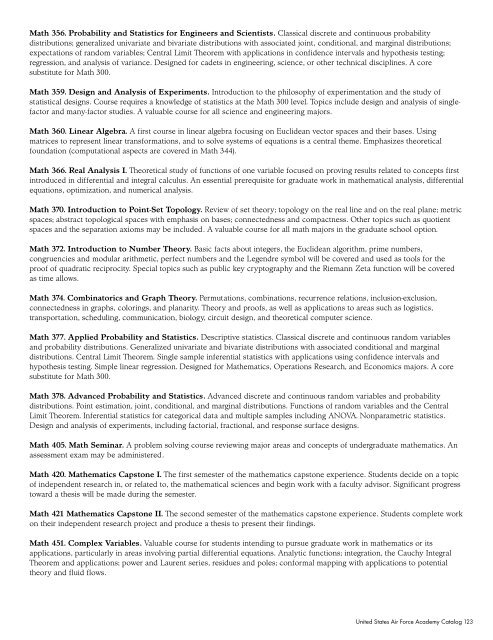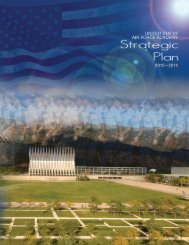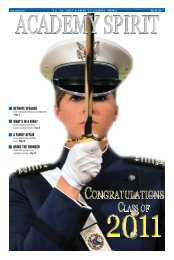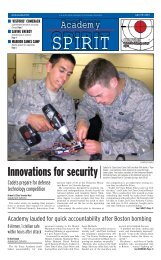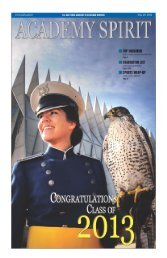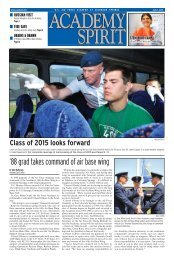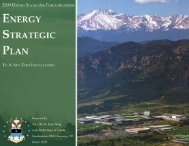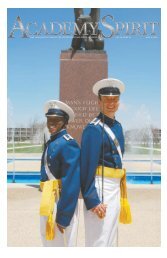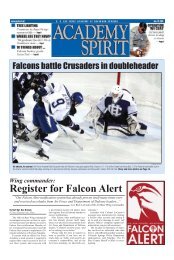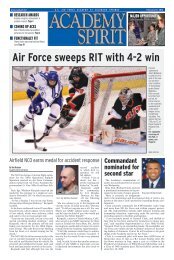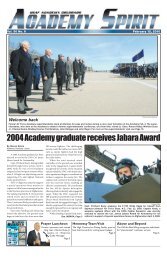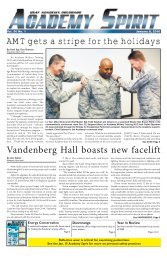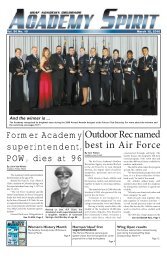2008-2009 Catalog - United States Air Force Academy
2008-2009 Catalog - United States Air Force Academy
2008-2009 Catalog - United States Air Force Academy
You also want an ePaper? Increase the reach of your titles
YUMPU automatically turns print PDFs into web optimized ePapers that Google loves.
Math 356. Probability and Statistics for Engineers and Scientists. Classical discrete and continuous probability<br />
distributions; generalized univariate and bivariate distributions with associated joint, conditional, and marginal distributions;<br />
expectations of random variables; Central Limit Theorem with applications in confidence intervals and hypothesis testing;<br />
regression, and analysis of variance. Designed for cadets in engineering, science, or other technical disciplines. A core<br />
substitute for Math 300.<br />
Math 359. Design and Analysis of Experiments. Introduction to the philosophy of experimentation and the study of<br />
statistical designs. Course requires a knowledge of statistics at the Math 300 level. Topics include design and analysis of singlefactor<br />
and many-factor studies. A valuable course for all science and engineering majors.<br />
Math 360. Linear Algebra. A first course in linear algebra focusing on Euclidean vector spaces and their bases. Using<br />
matrices to represent linear transformations, and to solve systems of equations is a central theme. Emphasizes theoretical<br />
foundation (computational aspects are covered in Math 344).<br />
Math 366. Real Analysis I. Theoretical study of functions of one variable focused on proving results related to concepts first<br />
introduced in differential and integral calculus. An essential prerequisite for graduate work in mathematical analysis, differential<br />
equations, optimization, and numerical analysis.<br />
Math 370. Introduction to Point-Set Topology. Review of set theory; topology on the real line and on the real plane; metric<br />
spaces; abstract topological spaces with emphasis on bases; connectedness and compactness. Other topics such as quotient<br />
spaces and the separation axioms may be included. A valuable course for all math majors in the graduate school option.<br />
Math 372. Introduction to Number Theory. Basic facts about integers, the Euclidean algorithm, prime numbers,<br />
congruencies and modular arithmetic, perfect numbers and the Legendre symbol will be covered and used as tools for the<br />
proof of quadratic reciprocity. Special topics such as public key cryptography and the Riemann Zeta function will be covered<br />
as time allows.<br />
Math 374. Combinatorics and Graph Theory. Permutations, combinations, recurrence relations, inclusion-exclusion,<br />
connectedness in graphs, colorings, and planarity. Theory and proofs, as well as applications to areas such as logistics,<br />
transportation, scheduling, communication, biology, circuit design, and theoretical computer science.<br />
Math 377. Applied Probability and Statistics. Descriptive statistics. Classical discrete and continuous random variables<br />
and probability distributions. Generalized univariate and bivariate distributions with associated conditional and marginal<br />
distributions. Central Limit Theorem. Single sample inferential statistics with applications using confidence intervals and<br />
hypothesis testing. Simple linear regression. Designed for Mathematics, Operations Research, and Economics majors. A core<br />
substitute for Math 300.<br />
Math 378. Advanced Probability and Statistics. Advanced discrete and continuous random variables and probability<br />
distributions. Point estimation, joint, conditional, and marginal distributions. Functions of random variables and the Central<br />
Limit Theorem. Inferential statistics for categorical data and multiple samples including ANOVA. Nonparametric statistics.<br />
Design and analysis of experiments, including factorial, fractional, and response surface designs.<br />
Math 405. Math Seminar. A problem solving course reviewing major areas and concepts of undergraduate mathematics. An<br />
assessment exam may be administered.<br />
Math 420. Mathematics Capstone I. The first semester of the mathematics capstone experience. Students decide on a topic<br />
of independent research in, or related to, the mathematical sciences and begin work with a faculty advisor. Significant progress<br />
toward a thesis will be made during the semester.<br />
Math 421 Mathematics Capstone II. The second semester of the mathematics capstone experience. Students complete work<br />
on their independent research project and produce a thesis to present their findings.<br />
Math 451. Complex Variables. Valuable course for students intending to pursue graduate work in mathematics or its<br />
applications, particularly in areas involving partial differential equations. Analytic functions; integration, the Cauchy Integral<br />
Theorem and applications; power and Laurent series, residues and poles; conformal mapping with applications to potential<br />
theory and fluid flows.<br />
<strong>United</strong> <strong>States</strong> <strong>Air</strong> <strong>Force</strong> <strong>Academy</strong> <strong>Catalog</strong> 123


